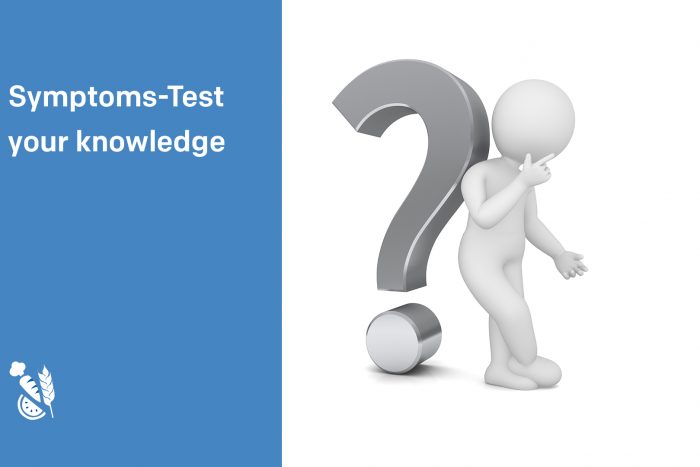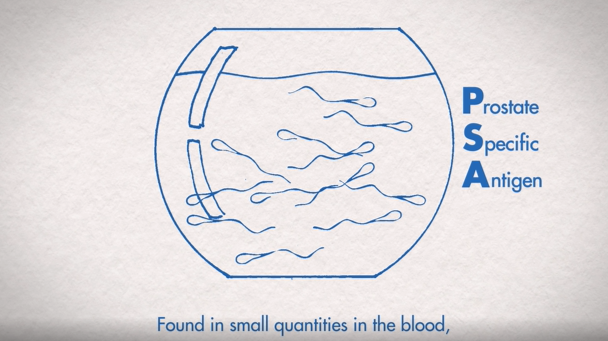Test Your Knowledge is a fun little quiz that covers five major topics related to prostate cancer: prevention, symptoms, screening, diagnosis, and treatment. You will, therefore, find below five questions testing your knowledge which relates to the second topic being symptoms. You will find the answers at the bottom of the page. Have fun and learn more about prostate cancer!

Test your knowledge in 5 questions
Prostate cancer does not cause symptoms in its early stage
TRUE or FALSE
Symptoms of an enlarged prostate (BPH) may include:
A – A need to urinate often day and night
B – An urgent need to urinate
C – Difficulty starting or stopping urinating
D – A feeling of not emptying your bladder
E – All these answers
Fever and chills are symptoms of prostate cancer or BPH
TRUE or FALSE
Which of the following symptoms is not associated with tumor progression or metastasis?
A – Urinary changes
B – Hot flushes
C – Weight loss and general condition
D – Pain in the lower back or hips
You can have very aggressive prostate cancer without symptoms
TRUE or FALSE
Answers
Prostate cancer does not cause symptoms in its early stage
Thank you for your participation. The answer is TRUE!
It is common for prostate cancer, in the very early stages, to cause no symptoms due to its generally slow development. Symptoms may appear if the tumor grows and compresses your urethra – causing changes in your urinary habits or other problems (the tumor does not usually cause prostate pain proper) – or if your cancer has metastasized and that the bone tumors are quite large.
As mentioned above, it should be kept in mind that all of these symptoms are usually caused by a benign enlargement of the prostate gland which occurs with age and not by prostate cancer. They can also be caused by other problems related to the urinary tract, including bacterial or infectious prostatitis, among others.
Symptoms of an enlarged prostate (BPH) may include:
Thank you for participating! The answer is E!
A – A need to urinate often day and night
B – An urgent need to urinate
C – Difficulty starting or stopping urinating
D – A feeling of not emptying your bladder
E – All of these
The medical term for large prostate is enlarged or benign prostatic hyperplasia (BPH). BPH increases the size of your prostate, which can compress the urethra that passes through the center of your prostate. This can hinder your flow of urine from the bladder through the urethra to the outside. It can cause urine to return to the bladder (urinary retention) and increase the need to urinate frequently during the day and night. Other common symptoms include slow urine flow, the urgent need to urinate, and difficulty starting the urine flow. More serious problems include urinary tract infections and complete blockage of the urethra, which can be a medical emergency and cause kidney damage.
Fever and chills are the symptoms of prostate cancer or BPH
Thank you for your participation. The answer is FALSE!
These are symptoms of acute bacterial prostatitis, an infection of the prostate. The bacteria can come from the bladder, intestines or blood to reach the prostate. Symptoms suddenly appear and this condition can be severe and require hospitalization with intravenous antibiotic therapy. Symptoms associated with acute bacterial prostatitis are muscle pain in the thighs, lower back and pelvic area, and fever. There may also be a complete inability to urinate (acute urinary retention). This condition can be caused, among other things, by a urinary tract infection, a biopsy or due to the use of a catheter.
Which of the following symptoms is not associated with tumor progression or metastasis?
Thank you for your participation. The answer is B!
A – Urinary changes
B – Hot flushes
C – Weight loss and general condition
D – Pain in the lower back or hips
Hot flashes are a side effect of hormone therapy, not cancer. About 50-80% of men on hormone therapy for prostate cancer will experience some form of hot flashes.
It is a sudden sensation of heat in the face and chest which then spreads to the rest of the body in waves, lasting 2 to 30 minutes. You can also sweat, blush, feel your struggling heart, or feel anxious. The exact cause of hot flashes is unknown, but it may be related to the way hormones interact with the hypothalamus, the part of your brain that controls body temperature.
Click here to learn more and how to manage this side effect.
You can have very aggressive prostate cancer without symptoms
Thank you for your participation. The answer is TRUE!
As prostate cancer develops “in silence” in the majority of cases, a man can live with this disease without suspecting anything. About 80% of prostate cancers are discovered by chance during a routine exam. They did not start to cause symptoms and the men are feeling quite well. Sometimes the disease is in its infancy, sometimes it is quite advanced. In fact, sometimes cancer has reached the pelvic nodes and even the bones without causing a single symptom. This occurs when the tumor in the prostate has remained small enough and has spread elsewhere without the metastases becoming large enough to cause noticeable health problems.
Discover our new animated videos
Discover three new animated videos, each equally unique and original from one to the other. Be on the lookout!
Here is the first one – Symptoms, Risk and Screening
Take the time to visit each of our pages on this website, as well as our YouTube channel, in order to get familiar with the disease with our expert lectures, our section on available resources, the support that is offered to you.
Do you have any questions or concerns? Above all, do not hesitate. Contact us at 1 855 899-2873 to discuss with a nurse specializing in uro-oncology. It’s simple and free, like all our services.
Pages of our site that might interest you
Want to know more? Just click on one of the links below.
Recognize the signs and symptoms
Prostate-related diseases
PROCURE news that may interest you
Each week, we publish a blog article. Here are a few for you.
Prostate Cancer: Did You Say Zero Symptoms?
Top 5 Men’s Health Risks
PSA Test: Yes, No, Maybe?
Written by PROCURE. © All rights reserved – 2021



 ADDITIONAL RESOURCES
ADDITIONAL RESOURCES


